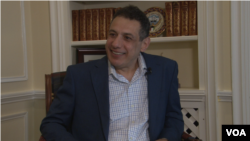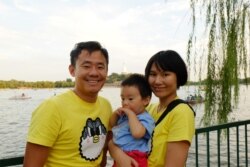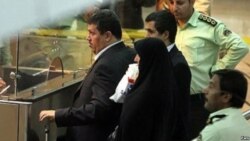This article originated in VOA’s Persian Service.
A Lebanese U.S. permanent resident released by Iran last month after almost four years in prison says he formed close bonds with other inmates, including a little-known Iranian who also has U.S. residency.
In a VOA Persian interview at his Washington home last week, Nizar Zakka shared new details of his interactions with the other detainees at Tehran’s Evin prison, where he spent a year in solitary confinement after his September 2015 detention before being moved to a cell with 50 other people. Iranian authorities released him from the prison June 11 and allowed him to fly to Lebanon. A week later, Zakka returned to Washington to reunite with his three sons.
An Iranian judge sentenced Zakka, an internet freedom activist, to 10 years in prison in September 2016 on national security-related charges that Zakka dismissed as trumped up after being released. He had traveled to Iran in 2015 at the invitation of one of Iran’s vice presidents to participate in a conference.
Zakka spoke warmly of his fellow inmates, who included Chinese-American Xiyue Wang, Iranians with dual nationalities and other ties to the West, and prominent Iranian political figures.
“They all are oppressed and angry, but at the same time, these people really support you so much,” he said.
Referring to the Iranian detainees, Zakka said they apologized to him for his predicament.
“They cook food for you and go out of their way to please a foreigner even if they are in jail. The Iranians will do everything to be a good host,” he added.
Naming some of the 50 people detained in his cell, which he said consisted of three small rooms, Zakka identified one of them as Shahab Dalili, a previously little-known detainee whom he described as an Iranian U.S. permanent resident.
Taghato, a Persian news outlet run by U.S.-based Iranians, posted a September 2018 tweet in Farsi saying Dalili is a retired Iranian ship captain who was residing in the U.S. when he flew back to Iran in 2016 after his father died. It said Iranian authorities arrested him at an airport March 20, 2016 and later sentenced him to 10 years in prison for allegedly cooperating with a hostile government.
The news outlet also said Dalili’s wife and children had kept silent about his case since his arrest. Besides two other Persian Twitter users who tweeted links to a human rights report about Dalili’s detention, no other references to his case could be found online. VOA Persian could not immediately identify or contact any of his family members.
A LinkedIn page that appears to belong to Dalili says he is based in Alexandria, Virginia, and serves as chief executive of Bright Star Marine Survey & Consultancy, which the page says provides “quality marine survey and consultancy service to all interests in marine industry.” A link to the company’s website was not working. The page also says Dalili retired in 2012 from a 26-year career with Islamic Republic of Iran Shipping Lines (IRISL), Iran’s state-owned maritime fleet. The Trump administration re-imposed sanctions on IRISL last November.
In his interview, Zakka praised Xiyue Wong as a “very nice guy.” Wong is a Princeton University graduate student who was studying Farsi in Iran when authorities detained him in August 2016, before sentencing him the following year to 10 years in prison for alleged espionage. Zakka identified another cellmate as Kamran Ghaderi, an Iranian-Austrian dual national also detained on spying charges since making a business trip to Iran in January 2016.
Zakka said other inmates who shared the cramped basement cell included prominent Iranian political figures Mehdi Hashemi Rafsanjani, the son of late Iranian president Akbar Hashemi Rafsanjani, and former Iranian vice president Esfandiar Rahim Mashaei, who served during the presidency of Mahmoud Ahamdinejad. He described their living conditions as harsh, with poor quality air and sewage flowing nearby as he and his fellow detainees spent most of their days in tiny bunk beds that he said felt like coffins, with guards allowing them to have only two hours of access to sunlight a day.
“I felt as if they were family and I want to keep my relationship with them,” Zakka told VOA Persian. “They all asked me, are you going to forget about us when you (leave)?’ I said, I will never forget about you because you are more than family. I’m going to keep remembering this place and remembering what happened to you, so that it will not happen to other people.”






